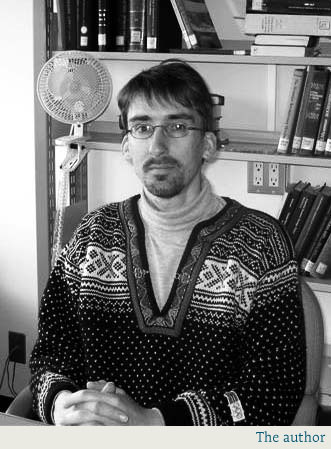| Annual Newsletter of the Slavic Research Center,
Hokkaido University |
||
| No.12
, December 2004 |
back to INDEX>> | |
Essays
| INOUE Koichi |
Victor Shnirelman |
Paul Werth |
| |
Marriage, Religion, and Law: Then and Now |

Despite claims that scholarship is always informed by contemporary politics and circumstances, it is not often that my research interests hav intersected in any substantial way with current events. At present, however, this has turned out to be the case, if only indirectly. Accompanying the recent presidential election in the United States were ballot initiatives in eleven separate states — all of which passed successfully — designed to block the possibility of the legal recognition of gay marriage. Meanwhile, the government of Spain is moving towards the recognition of gay marriage, which would make that country the third in Europe, after the Netherlands and Belgium, to do so. Not surprisingly, opposition to these measures comes to a large extent from either religious institutions or groups with a strongly religious orientation.
As a historian of imperial Russia, I do not study gay marriage, but my research does concern marriage, religion, and law, and it is in this sense that my work here at the SRC intersects with current events. Indeed, I have so far taken advantage of the congenial atmosphere and remarkable library resources at Hokkaido University primarily in order to work on an essay examining the legal regulation of mixed (or interconfessional) marriage in the Russian empire from Peter the Great to the revolution of 1917. My goal in this essay is to complicate our understanding of matrimonial politics in Russia by calling attention to the wide range of religions in the empire and to the challenges that arose when marriages were contracted between the adherents of different confessions. The contentious discussion of gay marriage in the US and Spain has only served to convince me of the continued significance of religion in the legal definition of marriage in even ostensibly secular states today. For if some of the opponents of gay marriage are motivated by largely secular forms of homophobia or an unspecified sense of discomfort with such an idea, then frequent reference to the "sacred" character of marriage suggestions that many people are still informed by a fundamentally religious conception of matrimony. In short, when the discussion turns to marriage, law is at issue as well, while religion is almost always standing nearby.
Indeed, I suspect that my larger interests in the history of religion and freedom of conscience are informed by the perception that religion, aside from being crucial to the mentalities and the institutional organization of human society in the past, remains significant in the twenty-first century, despite numerous predictions about secularization and the "death of God." When reading discussions about the new law in France prohibiting "ostentatiously" religious attire in secular schools, the state's attempts to institutionalize French Islam, and references to the veil as a matter of "politics" rather than religion (or vice versa), I am reminded of controversies in imperial Russia in the nineteenth and early twentieth century. The larger project that I am researching here at the SRC concerns religious toleration and the (partial) construction of a modern civil order in the Russian empire. My central concern is to elucidate the ways in which confessional institutions and practices mediated the integration of Russia's diverse imperial subjects into a single imperial society (or multiple societies). The US elections and prevalence of "moral values" in many people's voting suggests that religion plays a certain mediating role even today.
Of course, if religion remains important in the modern age, that importance takes new forms and produces controversies very different than the ones in the past. The Russian empire steadfastly refused to recognize even civil marriage (i.e., marriage not concluded by religious ceremony), so that the idea of gay marriage would have been completely alien and utterly incomprehensible. Likewise, the central conflict today seems to be less between different religions than between secularism and religiosity. In the French case Islamic expression faces "secular fundamentalism" in the US blue communities face red ones, etc. Yet to the extent that these modern conflicts involve law, religion, and the state, I remain convinced of the relevance of my research, and I thank the SRC for creating the conditions in which I have been able to pursue it.